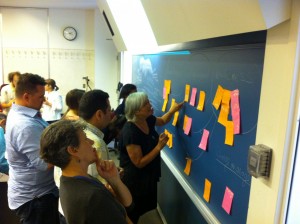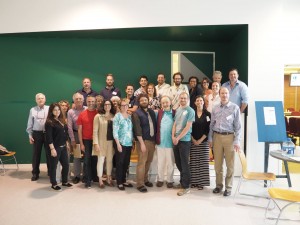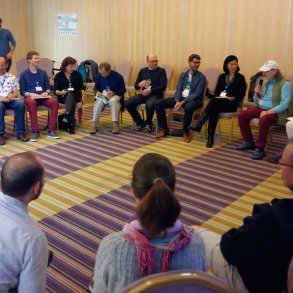A Future Considerations workshop held in Montreal 10th June 2015
A story of the epidemic of managing without soul

“When we asked the members of our new health care management class to share stories about their experiences, an obstetrician told one about the time when, as a resident, he was shuttling between the wards of different hospitals. One stood out: he and his colleagues loved working there. It was a happy place, thanks to a head nurse who cared. She was understanding, respectful of everyone, intent on promoting collaboration between doctors and nurses. The place had soul.
George is developing an open source version of his public-enrolment workshop, which will come complete with a Facilitator Guide and training for workshop facilitators
Then she retired, and was replaced by someone very qualified in nursing, with an MBA. Without any conversation… she started questioning everything. She was strict with the nurses, for example arriving early to check who came late. Where there used to be chatting and laughing before the start of shifts, ‘it became normal for us to see one nurse crying’ because of some comment by the boss.
Morale plummeted, and soon that spread to the physicians: “It took 2-3 months to destroy that amazing family…. We used to compete to go to that hospital; [then] we didn’t want to go there anymore.” Yet “the higher authority didn’t intervene or maybe was not aware” of what was going on. They were no better.”
The workshop opened with one participant reading that story from Henry Mintzberg’s blog. To this George Pór, the workshop facilitator, added we’re here to help end this kind of story, to end this epidemic. There was a silent yet palpable agreement in the room. The workshop with its 30 participants, as part of the The Next Edge Festival, was off to a stimulating start.
What happened
Inspired by the work of Frederic Laloux, the workshop was built from a combination of hands-on group exercises, teachings, videos, and collective intelligence practices that demonstrated new organisational prototypes.
The first session began with a meditation, followed by people putting their burning questions on Post-It notes to develop their shared learning agenda, by discovering the potential lying dormant in the tensions that produced those questions.
The participants also carried out dyad and group exercises in which they examined the circumstances and inner conditions that previously allowed significant shifts in values to take place in their own lives, as well as the obstacles to those shifts. They identified such key elements for the first as self-compassion, letting go of fixed identities, and having a sense of inner spaciousness. The main hindering factor identified was the fear of the unknown that may come with the change.
Participants were also introduced to Holacracy – a system of self organisation that releases energy within organisations. It does that by distributing authority and decision-making through a network of circles and roles that can respond quickly and effectively to complex situations better than having authority and decision-making vested in cumbersome hierarchies of management.
There was a short but essential teaching about how the three breakthroughs of next-stage organisations, discovered by Laloux—evolutionary purpose, wholeness and self-management—could be translated and embodied in our own lives as individuals. Some of the learning was facilitated by using the body (which is often completely neglected in business) via games that helped the participants to appreciate the use of both left- and right-brained sensing and responding.
 The workshop concluded with a World Café, a conversational process based on a set of integrated design principles that reveal a deeper living network pattern. (It’s a method that George helped in developing 20 years ago.) The original burning questions that people had come with were clustered and ranked by the group as a whole, then investigated in alternating teams. Collective intelligence was elicited with each table co-creating a report with their main insights, learnings and actions to take forward. The final insights in the closing circle included the participants’ proposals to connect after the workshop and the wish to bring back George Pór for another one in September.
The workshop concluded with a World Café, a conversational process based on a set of integrated design principles that reveal a deeper living network pattern. (It’s a method that George helped in developing 20 years ago.) The original burning questions that people had come with were clustered and ranked by the group as a whole, then investigated in alternating teams. Collective intelligence was elicited with each table co-creating a report with their main insights, learnings and actions to take forward. The final insights in the closing circle included the participants’ proposals to connect after the workshop and the wish to bring back George Pór for another one in September.
And that’s not the end of this story. To give a tailwind to the movement that is taking off, George is developing an open source version of his public-enrolment workshop, which will come complete with a Facilitator Guide and training for workshop facilitators, by the end of the year. Contact him at george(at)enliveningedge(dot)org and tell how you want to get involved.
Contributed by Andy Paice



